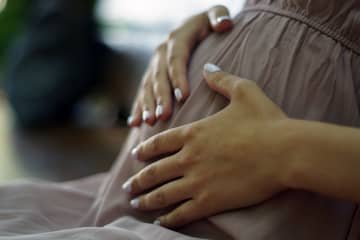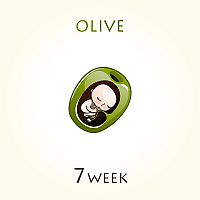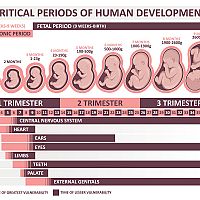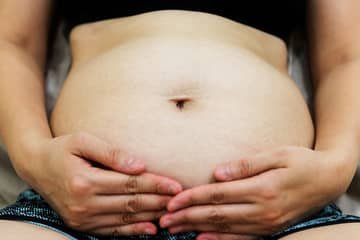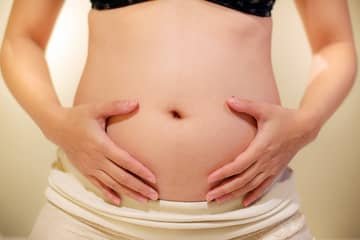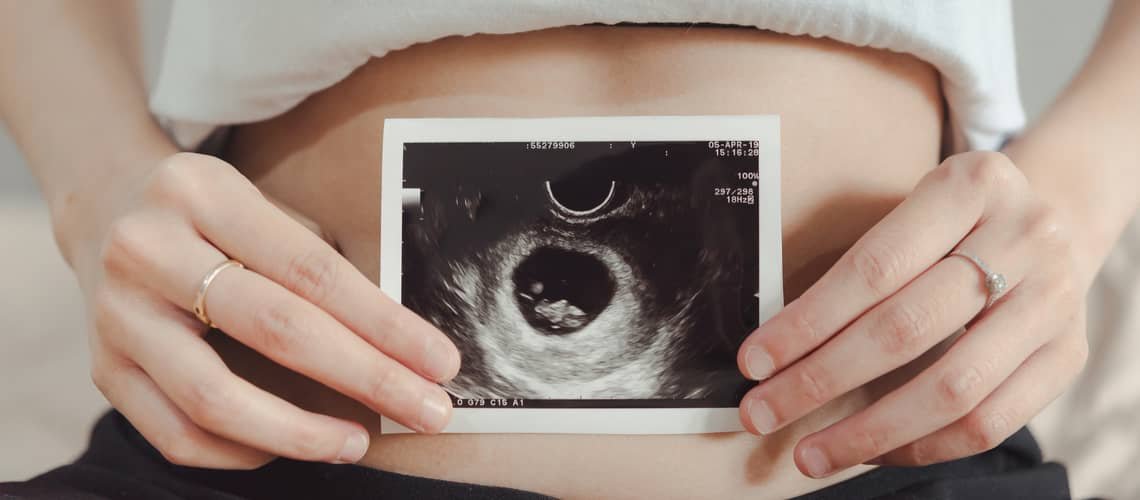
7th week of pregnancy - symptoms, pain in the lower abdomen, size of the fetus. Which month is it?
In this week, another important step in the development of the embryo occurs. In the previous weeks, the development of important organs began, including the brain and spinal cord. In the 7th week of pregnancy, the embryo develops and grows rapidly. Ultrasound can now also reveal details such as eyes, eyelids or even the mouth. The expectant mother can observe other changes in herself, which she will also feel at the same time. Although the abdomen is still not visible in the 7th trimester, the uterus has doubled in size. Pregnancy is very individual, therefore different symptoms can have different intensity. However, it is still possible that you still have no symptoms. What happens in a woman's body in the 7th week of pregnancy? Is it time to undergo sono in the 7th week of pregnancy? What month is the woman currently in?
It is quite likely that exactly 5 weeks after conception, you will go to your doctor for an examination to officially confirm your pregnancy. You might even see your baby on ultrasound for the first time and hear his heartbeat. The baby grows very fast in the womb and increases in size from week to week. This also affects the woman herself. There may even be an increase in weight in the hundreds of grams. However, you are still far from the pregnant belly, so put off looking in the mirror for now. For some women, the typical symptoms of pregnancy are a matter of course, while others are lucky enough to not experience any significant symptoms. And how does the baby develop?
7th week of pregnancy – baby's development and growth spurt
The embryo (baby) enters a period of rapid growth. Some doctors refer to it as a growth spurt. At the beginning of development and cell division, the embryo consisted of tens, later hundreds and thousands of cells. In this phase, it consists of over a million cells. At the beginning of the 7th trimester, the CRL (note more about the CRL in the article 6th week of pregnancy ) can be around 6 mm, but at the end of it, it can easily be 15 mm. Its size can be compared to a grape or a blackberry. The largest is the header. The brain of the embryo grows very quickly at this stage and the frontal area is strongly formed. On average, a child now grows 250,000 brain cells, within one minute. The neural tube, where the spinal cord and brain are located, is already definitively closed.
The eyes that can cover the growing eyelids are already clearly distinguishable. Ear and nose sockets are already recognizable by ultrasound. The same goes for the mouth and tongue, which are beginning to develop. Although the limbs are tiny, they are visible and their position is clearly recognizable. It is enormously important that important systems are beginning to form. The development of the digestive system is necessary for the nutrition of the fetus, organs such as the pancreas, esophagus, stomach and cecum begin to develop. Furthermore, the foundations of the genitals are formed this week. The liver or paired organs, such as lungs and kidneys, are formed more significantly. The umbilical cord has also formed, which already has a developed distribution network from the growing placenta to the baby.
The circulatory system starts to become more efficient and the heartbeat can usually be heard on the ultrasound. The heart has a rhythm of approximately 150 to 180 beats/min. You may be surprised that "the baby is already moving". Towards the end of the 7th week of pregnancy, the embryo can move its limbs. Of course, a pregnant woman cannot feel these micro movements of such a small fetus. Small outgrowths begin to develop on the limbs, which are the basis for fingers.
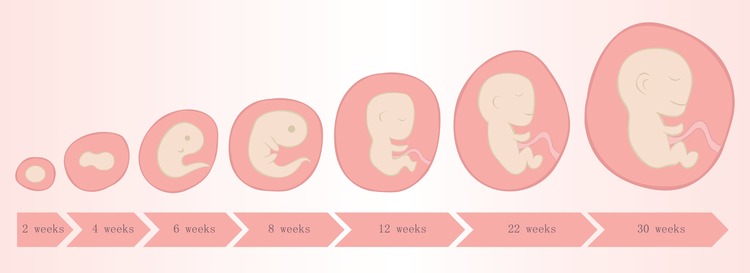
Ultrasound in the 7th week of pregnancy - body and placenta
The amniotic sac is already well developed and amniotic fluid is beginning to accumulate in it. The embryo begins to resemble more the shape of the human body. The head is disproportionately large compared to the body, which is fine considering the rapid growth of the brain. If you go for the first ultrasound in the 7th week of pregnancy, in addition to the head, the body and limbs will also be clearly recognizable. The tail, from which the back part will gradually begin to form, continues to shrink. The yolk sac, the vessels of the growing placenta and the umbilical cord are clearly visible. You can hear the heartbeat on the ultrasound and also, if you are lucky, the doctor may show you the movements of the embryo.
If it is your first "pregnancy" visit to the gynecologist, you will arrive on an empty stomach, the doctor will confirm your pregnancy with an ultrasound (note: the doctor will rule out an ectopic pregnancy and confirm a possible multiple pregnancy), or vaginal probe and you will also undergo basic examinations. Blood and urine samples will be taken, your blood pressure will be measured, the doctor will find out your medical history, health status, possible allergies, diseases that you have overcome and will monitor the level of antibodies against serious diseases with laboratory tests. Tell the doctor when you had your last period and also the approximate time of conception. He will recommend possible further examinations and arrange the date of the next consultation with you. The date of birth will be determined approximately and will be specified. You will start keeping a pregnancy book.
7th week of pregnancy - symptoms and feelings
What are the feelings of a woman in the 7th week of pregnancy? What symptoms are fully manifested? Some women might think that if the baby is growing like this, the pregnancy belly is an issue, but the fact is that you won't see the belly for several weeks. However, the uterus, which is more blood-supplied, has grown in size. It is even possible that you will gain a few hundred grams of weight (note that if you do not vomit and do not have morning sickness, on the contrary, weight loss may also occur).
When it comes to pregnancy symptoms, it is not at all unusual that there are women who do not feel any symptoms even in the 7th week of pregnancy. This may make some expectant mothers envious, because otherwise there are completely normal symptoms, such as frequent urination, gas, constipation, diarrhea, bloating, headaches, heartburn, a more sensitive sense of smell, metallic taste in the mouth, fatigue and also sensitivity or irritability. Some women also have problems with increasing acne and oily skin. Morning sickness, a greater appetite or, conversely, an aversion to certain ingredients are typical. Breasts increase, even by one size, nipples darken and become more sensitive. Pregnancy hormones are naturally responsible for many changes.
Some women experience pain in the lower abdomen during the 7th week of pregnancy. However, in the 1st trimester, they are relatively common and there is no immediate need to worry. The uterus grows, is more blood-stained, and occasional stretching of the ligaments can cause mild cramps. If the pain is accompanied by intense bleeding, dizziness or vomiting, it may be a miscarriage, so it is necessary to visit a doctor or emergency room immediately.
Vaginal discharge and mucus plug
In pregnant women, vaginal discharge may change during this period. The reason is that a mucus plug begins to form. During pregnancy, women's bodies are much more susceptible to various urinary tract infections, yeast infections and subsequent inflammation. Typical symptoms are itching, burning or pain when urinating, but also a change in discharge.
During this period, you can observe an increased intensity of the vaginal discharge of a milky color without odor. It's called leucorrhoea and it's completely normal. Its production increases because a mucus plug begins to form, which accumulates in the cervix. Gradually, this mucus creates a kind of barrier there, the task of which is to prevent bacteria from reaching the uterus and the fetus.
If the discharge turns greenish, dark yellow, dark brown and smells, it is probably an infection and it is necessary to see a doctor. Bleeding should no longer be present during this period. Light bleeding can still appear during the expected period or after sexual intercourse. However, if the spotting and bleeding is regular and is accompanied by other symptoms such as pain, cramps or dizziness, it may be a complication.
7th week of pregnancy - experiences
And what do mothers most often deal with in the 7th week of pregnancy? The primary topic is pregnancy symptoms. They are very individual for all women. It is often the case that women suffer from constipation, have a bloated abdomen and experience abdominal pain or cramps. This is one of the typical symptoms. Several women recommend probiotics for pregnant women or to consume dairy products. However, in the discussions, one of the pregnant women addressed the fact that in the 7th week of pregnancy, the fetus was not visible on the sono examination, but only the yolk sac and a small tube. Several women stated that during a check-up with a gynecologist, the fetus could only be seen around the 8th to 9th trimester and the heartbeat could not be heard until around the 10th trimester. Also, for some women, the intense symptoms seemed to subside, which was also not a bad sign, and the pregnancy was fine.
The most frequent questions - FAQ
How do you feel in the 7th week of pregnancy? What pregnancy symptoms have you noticed at this stage? Do you feel nauseous or do you urinate more often ? Did you already have an ultrasound in the 7th week? Did you have to deal with any complications with the doctor? We will be happy if you share your experiences with the course of pregnancy at this stage in the discussion below the article. No registration is required. For other expectant mothers, pregnant women and readers, your opinions, knowledge and recommendations can be very helpful in coping with current questions.
Is it appropriate to go for an ultrasound in the 7th week of pregnancy?
What is the size of the fetus in the 7th week of pregnancy?
Is spotting in the 7th week of pregnancy normal?
7th week of pregnancy, which month is it?
Gallery
Pridať komentár

